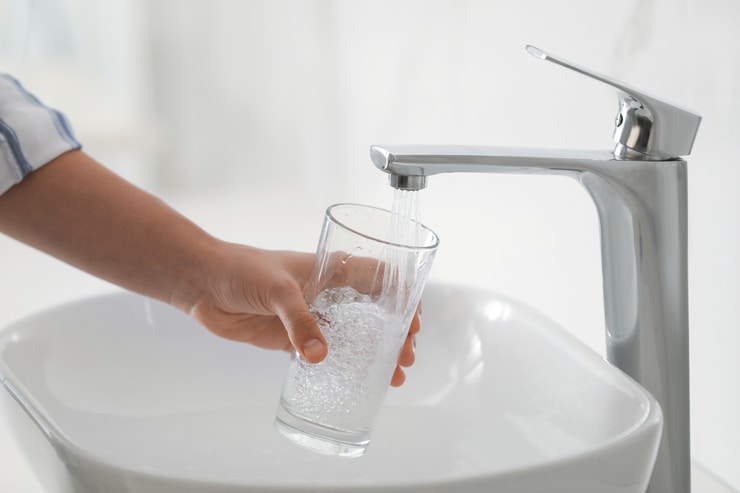Taking a drink from your bathroom tap seems harmless enough. You wake up in the morning or in the middle of the night feeling parched, so you go into the bathroom and take a sip of water from the tap.
Not to mention, you’re likely using water from the bathroom tap when brushing your teeth, so drinking it wouldn’t cause you any serious harm. Or will it?
You’re in for surprise as bathroom tap water can contain many things that are not good for you.
Here’s everything to know before you take your next sip of tap water.

Is the Water from the Bathroom Tap Safe to Drink?
Grabbing water from the bathroom tap is relatively safe depending on how often you do that and the quality of water in your area. But it isn’t the healthiest and safest practice for many reasons.
- Many bathrooms have dated plumbing setups that may leech contaminants from dust, debris, buildup, and deterioration. Older houses with lead pipes are especially risky since lead is an incredibly toxic contaminant.
- Some bathrooms have common water pipes for the sink and toilet, putting your bathroom tap at a higher risk of contamination.
- Water supply for bathrooms may be treated or disinfected to a degree to make it suitable for brushing, hand washing, and showering, but not for consumption. Your home can have a filtered tap, but the filtration setup most likely doesn’t include the bathroom.
- Most bathrooms have a water reservoir that often sits idle until it is ready to be used, and that allows bacteria to grow and contaminate the water supply.
What Could Be in the Water from Your Bathroom Tap?
While your bathroom tap water may be drinkable, it doesn’t mean that it’s pure, healthy, or that you should drink it. Many people can easily get a low-grade infection because of the bacteria from the local water supply.
Here’s what your bathroom tap water may contain.
Heavy Metals
If you have soap scum, scale buildup, and stains in your bathroom, you probably have hard water. Generally, it’s considered safe to drink hard water, and some minerals it contains may even provide health benefits. Unfortunately, hard water can also be contaminated with heavy metals that cause serious toxicity.
Metals that can be found in hard water from your bathroom tap include manganese, cadmium, lead, arsenic, and copper. Even a small amount of these metals, like lead, can be dangerous once they accumulate in your body. This heavy metal will remain in your bathroom water unless the water has been treated and filtered to remove natural elements and toxins.
If the bathroom tap water tastes metallic, there are excess minerals in it that could be harmful if consumed frequently. The most common reason for that metallic taste in your water is the presence of high levels of iron. But contaminants such as copper, zinc, lead, and manganese can also produce a similar metallic taste.
Water Softeners
Hard water isn’t the safest to drink, but soft water is not much safer. If your bathroom has hard water and you used water softeners, that doesn’t necessarily mean that you can now drink from the bathroom tap without worry.
Most water softeners remove excess minerals from the hard water using sodium ions, leaving you with softened water containing higher levels of sodium. Like hard water, drinking soft water is generally safe if you don’t make it a habit. Otherwise, it can increase sodium levels in the body and might cause health issues for people with high-blood pressure.
Is Hot Tap Water in the Bathroom Safe?
Although heat can kill bacteria in water, that’s not a reason to start drinking hot tap water, especially if you got it from the bathroom sink.
Here’s why hot tap water can have even more contaminants than cold tap water:
- Heated water may cause the pipes in your plumbing system to release hazardous substances, like nickel and lead.
- While cold water is fresh, hot tap water is most likely stored for longer periods inside boilers and tanks, causing a higher risk of bacterial contamination.
- When your heater system doesn’t heat water enough, certain bacteria thrive in a warm environment.
Potential Risks of Drinking from the Bathroom Tap
It is unlikely that you will get sick or experience any adverse side effects if you drink a glass of water from the bathroom tap once or twice. Making it a habit, however, is another story.
If you drink contaminated water from the bathroom tap, you may be at risk for the following:
- Abdominal cramps
- Diarrhea
- Nausea
- Vomiting
- Headache
- Fever
- Fatigue
- Eye and skin irritation
- Chronic cough
- Numbness in hands and feet
These symptoms can manifest within 24 to 48 hours after drinking contaminated water from the bathroom tap and can last for a day or two and sometimes even longer.
Final Thoughts
Generally, tap water is safe to drink if it’s free of impurities, doesn’t smell, and doesn’t taste funny. Unfortunately, it is impossible to verify that your bathroom tap water is 100% safe to drink because it can still contain contaminants that are invisible to the naked eye.
So, as a safety precaution, avoid drinking from the bathroom tap. The water from your bathroom tap is perfectly fine to use when brushing your teeth, as long as you don’t swallow it. Keep a glass of filtered water on your nightstand instead of getting water from the bathroom faucet if you’re prone to getting thirsty in the middle of the night.

